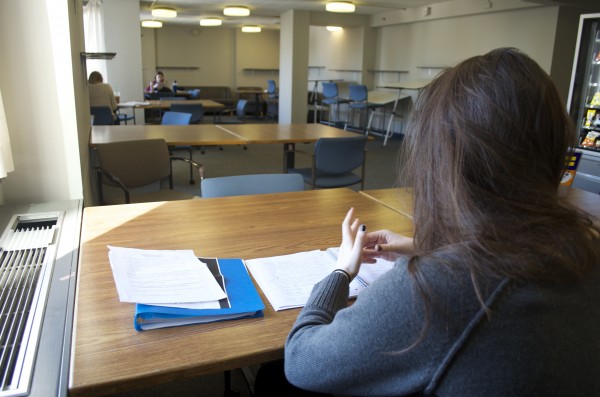Study Habits For Aceing Classes And Midterms
February 26, 2015
Ready or not, midterms are coming. Prepare yourself for full libraries, the late nights and the extra caffeine. Finding the perfect way to study may not be fun, but it’s the secret to acing exams and boosting that GPA. Looking for study ideas to get you through midterms? A few Fordham College at Lincoln Center (FCLC) students shared their favorite studying tips and even some of their most productive on-campus hideaways. From the quirky to the conventional, they’ve covered it all.
Marcela Alvarez, Gabelli School of Business at Lincoln Center (GSBLC) ’18, noted that during her study time, [she] “really likes to use a whiteboard, especially for math problems instead of writing them down on paper. I feel like I can see it better, and I can write bigger and erase things when I need to.” Alvarez also suggested getting a white board with a cork strip for pinning notes. Not doing a math problem? She has her own unique way of writing papers too. “When writing an English paper, I’ll write it out on paper first and then transfer it to my computer.” It’s an extra step, but it can make all the difference when trying to plan out that perfect paper. What’s her favorite study spot? The Law School Library, perfect for quiet and concentration.
For Amanda Ritchie, FCLC ’16, taking the longer way to do things can really pay off. Ritchie said, “I recopy all the notes that I take throughout the semester in a separate notebook because writing helps me remember things as opposed to typing.” Ritchie also has a memory trick of her own: “I use lots of colored sharpies. I’ll divide the different sections and categories by color, so that I’ll remember them by their color.” She called the Law School Café the perfect balance of quiet for studying. Her quirkiest study habit? Ritchie said, “I also sometimes study in the shower. I laminate pages and I stick them up in the shower and I study because there’s no one to bother me in there and I can focus.”
Keeping track of your workload is the key to some students’ success. Craig Appel, FCLC ’17 said, “I write everything down [including assignment due dates] so I know how much I can push [studying] off to. And usually I push it off to the very last minute, but at least I know it exists. That’s the most important thing, always know what’s going on.” Appel’s advice was simple and honest. He said, “Pick your focus when you’re studying. There’s so much that you have to do. The likeliness of you covering it all is slim.” As for his favorite study spot, Appel likes the quiet study rooms in the Law School Library.
Who knew that in an age of technology that so many students would enjoy studying the old fashioned way? Overall, paper and pen remained the most popular study tools. A little silence, a lot of focus and some visual aids can go a long way.
Fordham Professor of Theology, Comparative Literature and Women’s Studies Ben Dunning offered a few tips of his own. “Every course is different. In the core, it’s really important to get as clear an idea as possible from the professor so students aren’t wasting time,” Dunning said.
When you’re unsure, don’t be afraid to ask for clarification from your professor. Dunning said, “Think consciously and carefully on how you’re going to avoid distraction.” Dunning suggested putting your phone in a different room or turning off the wireless on your laptop during study time.
His second major tip? Study in increments. “Rather than trying to power through do stints of 20 minutes with a five-minute break in-between and do something fun during that break,” Dunning said. He also suggested setting study goals. This type of studying helps you stay motivated and stops you from potentially overworking your brain.
Study hard, because you can’t fake a solid understanding of the material. “Go back and read the texts again so you are as familiar as possible. I think that studying in groups is beneficial for some types of studying (memorizing vocabulary terms), but I’m not sure that working in groups is the best way to prepare for an essay. You can get together and discuss the material, but it’s no substitute for really immersing yourself in a text,” Dunning said. He understands that cramming for exams happens and admitted that it was once a part of his own college experience. That being said, exams tend to go better for students who study more in advanced.
Dunning’s last piece of advice was: “I do actually think that people learn in different ways. If you’re a freshman or a sophomore and still getting the hang of things, you should try a bunch of different ways and see what works for you.”












